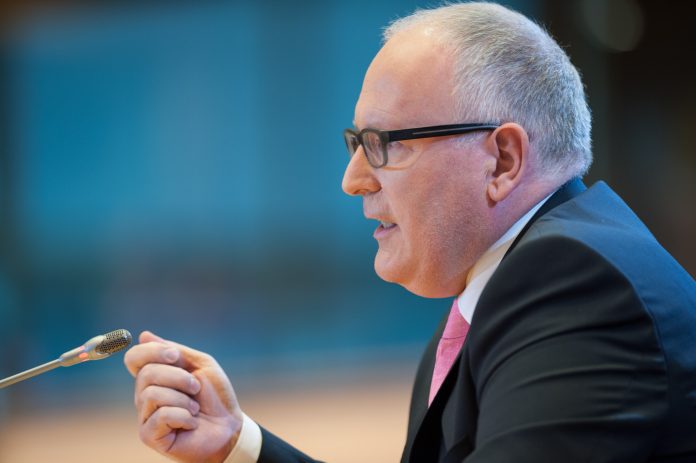The European Commission on March 8 unveiled its strategy for a financial system that supports the European Union’s climate and sustainable development agenda.
The plan, which will be discussed at a high-level conference on March 22, is part of the Capital Markets Union’s (CMU) efforts to connect finance with the specific needs of the European economy to the benefit of the planet and our society. It is also one of the key steps towards implementing the historic Paris Agreement and the EU’s agenda for sustainable development.
“Moving to a greener and more sustainable economy is good for job creation, good for people, and good for the planet,” said European Commission First Vice-President Frans Timmermans. “Today we are making sure that the financial system works towards this goal. Our proposals will allow investors and individual citizens to make a positive choice so that their money is used more responsibly and supports sustainability.”
According to a European Commission press release, around €180bn of additional investments a year are needed to achieve the EU’s 2030 targets agreed in Paris, including a 40% cut in greenhouse gas emissions. This is why, on the basis of the recommendations set out by the High-Level Expert Group on sustainable finance (HLEG), the Commission is setting out a roadmap to boost the role of finance in achieving a well-performing economy that delivers on environmental and social goals as well.
“Inspired by the work of the High-Level Expert Group, we are today presenting our plans for a far-reaching reform that could set the global benchmark for sustainable finance,” said Valdis Dombrovskis, Vice-President responsible for Financial Stability, Financial Services and Capital Markets Union. “Only with the help of the financial sector can we fill the annual €180 billion funding gap to reach our climate and energy targets. This will help to support a sustainable future for generations to come.”
In turn, Jyrki Katainen, Vice-President responsible for Jobs, Growth, Investment and Competitiveness said the EU is at the forefront of investing in resource efficiency and social infrastructure through the European Fund for Strategic Investments.
“At least 40% of EFSI infrastructure investments will be directed to projects that contribute to reaching the Paris Agreement goals to fight climate change,” he said. “At the same time, creating the conditions for private investors to invest sustainably is crucial to achieve the transition to a cleaner, more resource-efficient, circular economy.”
“Global investments hold the key to fighting climate change, with trillions already invested in solutions such as renewables and energy efficiency,” added Miguel Arias Cañete, Commissioner for Climate Action and Energy. “The Paris Agreement is a massive investment opportunity. How can we unlock it? Today’s action plan will help Europe’s financial sector position itself as a leading global destination for investments in green technologies.”
The Commission’s aim is to establish a common language for sustainable finance (a unified EU classification system – or taxonomy) to define what is sustainable and identify areas where sustainable investment can make the biggest impact.
Efforts include the creation of EU labels for green financial products on the basis of the EU classification system. The Commission will also clarify the duty of asset managers and institutional investors to take sustainability into account in the investment process and enhance disclosure requirements.
The Commission will also explore the feasibility of recalibrating capital requirements for banks (the so-called green supporting factor) for sustainable investments, when it is justified from a risk perspective, while ensuring that financial stability is safeguarded.
Another objective is to enhance transparency in corporate reporting by revising the guidelines on non-financial information to further align them with the recommendations of the Financial Stability Board’s Task Force on Climate-related Financial Disclosures (TCFD).
The Action Plan has received the backing of MEPs in the parliament. The Progressive Alliance of Socialists and Democrats (S&D) spokesperson for the economic and monetary affairs, Pervenche Berès, said his group is fully committed.
“The Commission’s plan puts forward ambitious proposals to achieve this goal: a support for a taxonomy and labels applied to all financial products, the use of sustainability-based benchmarks,” he said. “The presence of the social dimension of sustainability throughout the plan is for us a prerequisite.”
However, in areas such as the reform of the European Supervision Agencies and the role of the public sector, Berès called for “a follow-up through concrete legislative proposals is now necessary to move swiftly forward”.
In turn, S&D’s spokesperson on the sustainable finance, Paul Tang, said they have consistently argued for a strong sustainable dimension of the Capital Markets Union.
“To change the game of the financial sector, ambitious legislation is needed. The taxonomy needs a strong and balanced inclusion of environmental, social and governmental risks and factors. In addition, a mandatory due diligence should require investors to identify, prevent, mitigate and account for sustainability risks.”
Tang also stressed the need for the public sector to be considered as a risk taker, innovator and market creator. “This is key to develop a deep, liquid and efficient green bond market. The action plan does not include legislative initiatives for green bonds.”
“However, a legislative initiative on green bonds issued by existing and future European institutions, such as the EIB and the European Monetary Fund, can attract more private investment re-orienting capital flows towards sustainable and inclusive growth.”

